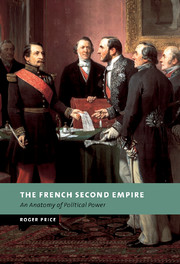Book contents
- Frontmatter
- Contents
- Acknowledgements
- List of abbreviations
- Introduction
- PART ONE THE RISE OF LOUIS-NAPOLEON BONAPARTE
- PART TWO STATE AND SOCIETY
- PART THREE THE RISE OF OPPOSITION
- 8 The context for opposition
- 9 The forms of opposition: (1) Legitimism
- 10 The forms of opposition: (2) Liberalism
- 11 The forms of opposition: (3) Republicans in the aftermath of the coup d'état
- 12 The forms of opposition: (4) The republican revival
- Conclusion to Part III
- PART FOUR WAR AND REVOLUTION
- General conclusion
- Select bibliography
- Index
11 - The forms of opposition: (3) Republicans in the aftermath of the coup d'état
Published online by Cambridge University Press: 14 August 2009
- Frontmatter
- Contents
- Acknowledgements
- List of abbreviations
- Introduction
- PART ONE THE RISE OF LOUIS-NAPOLEON BONAPARTE
- PART TWO STATE AND SOCIETY
- PART THREE THE RISE OF OPPOSITION
- 8 The context for opposition
- 9 The forms of opposition: (1) Legitimism
- 10 The forms of opposition: (2) Liberalism
- 11 The forms of opposition: (3) Republicans in the aftermath of the coup d'état
- 12 The forms of opposition: (4) The republican revival
- Conclusion to Part III
- PART FOUR WAR AND REVOLUTION
- General conclusion
- Select bibliography
- Index
Summary
INTRODUCTION
Republican opposition was the product of a founding ‘myth’ and of a shared political culture, language, and symbolism. Republicans shared with liberals their commitment to the central principles of 1789 – political liberty, civil equality, and the sovereignty of the nation. Additionally, they believed that the establishment of a republic based upon popular sovereignty, combined with the enlightenment resulting from universal instruction, freed from clerical obscurantism, would establish the preconditions for human happiness and indefinite progress. Republicans condemned the authoritarian and morally corrupt practices of monarchy and of an empire established by a coup d'état, which had been directed mainly at them. If there were important areas of agreement, republicans were also divided on both means and ends, largely as a result of the diverse traditions created between 1789 and 1799 and their subsequent re-interpretation. The heterogeneity of the ‘party’ was also evident in its social composition and the geography of support. Definitions of the vraie république differed inevitably. The main divisions, at the risk of simplification, were between ‘moderates’, who were virtually indistinguishable from liberals because of their economic liberalism, insistence on the sanctity of private property, and fear of the revolutionary potential of the ‘people’, and might be tempted to rally to a Liberal Empire; ‘radicals’ interested in, generally vague, measures of social reform, which would follow a change of regime; and revolutionary republicans, many of them influenced by Auguste Blanqui's conception of the leading role of a revolutionary elite, necessary in a society corrupted by twenty years of Imperial dictatorship, and willing to resort to violence in reaction to state repression, and as the means of establishing an egalitarian, socialist society.
- Type
- Chapter
- Information
- The French Second EmpireAn Anatomy of Political Power, pp. 318 - 343Publisher: Cambridge University PressPrint publication year: 2001



